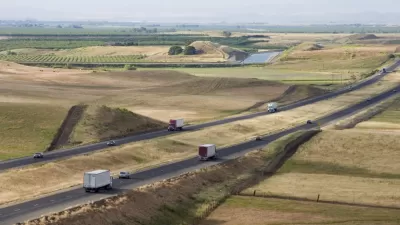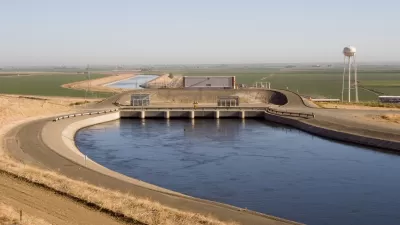California’s drought has the State Water Resources Control Board in "hyperdrive"—rushing to fill the gaps of a historic water-rights system, settle disputes over water use, and lay the groundwork for a sustainable future.
The board oversees California's intricate water-rights system, which is really an accumulation of three separate ones. It's based on seniority, so in dry periods, the claims of junior rights-holders are the first to be cut (or "curtailed.") But this drought is so severe that the board may have to curtail the rights of senior rights holders, too. And conditions on water rights—such as protections for wildlife—need to be revised, since they weren’t devised to accommodate “insanely dry” periods like this one.
Chair of the State Water Resources Control Board Felicia Marcus delved into the challenges of managing water during the drought with The Planning Report. The board does more than adjudicate rights—two of its core divisions are Water Quality and Drinking Water.
It also helps manage disputes over the Sacramento-San Joaquin River Delta. "It’s not just fish versus farmers—it’s farmers versus farmers," Marcus says. "We, along with the courts, are the umpires judging competing claims on water."
But Marcus has hope that the future brings local collaboration and stakeholder cooperation. She points to legislation from last year that requires local areas sharing a groundwater basin to jointly come up with a plan to maintain it. That law got the underlying philosophy about groundwater right, Marcus believes: "The goal should not be a top-down state regulatory program, but a framework for local action and success. We will do whatever it takes to help local areas take responsibility for what is, at heart, a community resource."
Overall, Marcus sees successful water policy as a result of players thinking beyond their own narrow interests:
"Breakthroughs in California water over the last few decades—whether it’s groundwater legislation, the Bay-Delta Accord I was privileged to work on in the ’90s, or the ’09 legislation I was also privileged to deal with—happened because players in different stakeholder groups looked across traditional divides... Solutions only come when people take action to connect with other people around a table, rather than standing in separate corners with their engineering, legal, or otherwise technical points of view."
FULL STORY: State Water Resources Board Wisely Navigates Challenges of Drought

Alabama: Trump Terminates Settlements for Black Communities Harmed By Raw Sewage
Trump deemed the landmark civil rights agreement “illegal DEI and environmental justice policy.”

Study: Maui’s Plan to Convert Vacation Rentals to Long-Term Housing Could Cause Nearly $1 Billion Economic Loss
The plan would reduce visitor accommodation by 25% resulting in 1,900 jobs lost.

Planetizen Federal Action Tracker
A weekly monitor of how Trump’s orders and actions are impacting planners and planning in America.

Wind Energy on the Rise Despite Federal Policy Reversal
The Trump administration is revoking federal support for renewable energy, but demand for new projects continues unabated.

Passengers Flock to Caltrain After Electrification
The new electric trains are running faster and more reliably, leading to strong ridership growth on the Bay Area rail system.

Texas Churches Rally Behind ‘Yes in God’s Back Yard’ Legislation
Religious leaders want the state to reduce zoning regulations to streamline leasing church-owned land to housing developers.
Urban Design for Planners 1: Software Tools
This six-course series explores essential urban design concepts using open source software and equips planners with the tools they need to participate fully in the urban design process.
Planning for Universal Design
Learn the tools for implementing Universal Design in planning regulations.
Caltrans
Smith Gee Studio
Institute for Housing and Urban Development Studies (IHS)
City of Grandview
Harvard GSD Executive Education
Toledo-Lucas County Plan Commissions
Salt Lake City
NYU Wagner Graduate School of Public Service





























